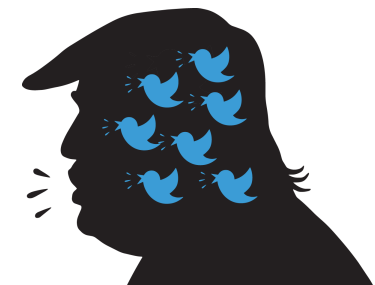President Trump began another controversial tweetstorm at 3:25 am on June 5, 2017. He tweeted four times within a half hour, scolding the Justice Department’s actions in the courts in reference to Executive Order 13769. The first statement Trump made explicitly labels his order as a “travel ban,” in spite of the Justice Department insisting it is not a ban. Trump also asserts that the original version of the order should never have been edited, the new version is too politically correct, and the Justice Department should create a “much tougher version” of the order. Putting aside the political discourse these statements create, can they effectively be applied to the Supreme Court case and discredit the Justice Department’s appeal?
The Supreme Court follows the “plain meaning rule” when interpreting statutes, unless bad faith, or intentions, can be proven under the Mandel Test. However, Trump’s statements throughout his campaign as well as recently, like the most recent tweetstorm, present concerns that he made the order in bad faith. Including Trump’s personal opinions in the Court may prove these concerns but may also set an unfair precedent for reviewing all actions of the government in the future. Both sides of the political spectrum could then attempt to strike down any government action on the basis of the Mandel Test. With these long-term risks, is it worth applying the Mandel Test to the order?
With all possible consequences, it is reasonable to believe that the Mandel Test should be applied and statements like this morning’s tweets should be considered. While it is true that executive power allows Trump to make immigration reforms and it has not yet been proven that the order itself promotes a Muslim bias, it would be damaging to the nation if all possibilities are not considered and powers are not effectively checked. Enough Americans suspect the order was motivated by racial and religious bias to necessitate the Court hears this case. However, not all of the statements made in this recent tweetstorm are relevant enough to attract worthy attention in the proceedings.
Many precedent decisions should be considered on a case by case basis, and Trump’s statements should be considered individually as well. Trump’s criticisms of the new version of the executive order are political statements unrelated to Muslim bias, even though criticizing the Justice Department may not generally be in his best interests. His other tweet, however, should be alarming to those in support of upholding the order. Publically stating that he refuses to refer to the order by anything but the “travel ban” will weaken his case in Court. By applying the Mandel Test to the 3:25 am tweet, the Court will see a glaring contradiction of what the Justice Department is trying to argue and what Trump is revealing to his followers. The contradiction itself presents the issue that one or the other must be lying about the true intentions of the ban. If it is truly a “ban” and not a pause on immigration, it could more easily be proven that the order was made in bad faith to keep Muslims out of the country. It is likely that the Court may oppose the order for these reasons, but even then, it is unclear which parts of the order can be interpreted literally and which are subject to Mandel. Time will tell if and when the Supreme Court accepts this appeal.
Brooke Blaney, a law clerk at Berenzweig Leonard, assisted Managing Partner Seth Berenzweig in writing this blog.

